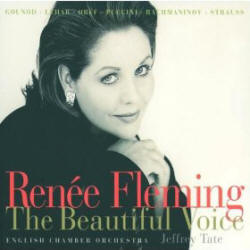|
You are reading the older HTML site Positive Feedback ISSUE july/august 2008
Renée Fleming, The Beautiful Voice
Renée Fleming, soprano; English Chamber Orchestra/Jeffrey Tate. Decca/London 289 458 858-2. TT: 69.27. I always look forward to Renée Fleming's aria recitals, the more recent, and probably inevitable, critical backlash notwithstanding. She unfailingly deploys her warm, feminine soprano with musical and technical assurance. If her performances don't eclipse those of the great sopranos of the last century, they nonetheless resonate with the singer's distinctive charm and personality. But the first track here—Louise's Depuis le jour—had me worried about Fleming's vocal condition. It's not that she sings it badly, but that she's working so hard at it. The tone and manner are sufficiently labored that the sound, although pretty, doesn't draw you in. Only the final high B on "Ah! je suis heureuse" emerges with the spin one expected throughout the aria. Immediately thereafter—at least in this program order—Fleming sings Marguerite's Jewel Song with all the float, dexterity, and liquid legato that were missing from the Charpentier. (Fleming might as well drop that latter aria from her repertoire—she seems technically and temperamentally at odds with it, and, at this stage of her career, she's hardly likely to be cast as a waif.) The rest of the singing here, fortunately, resembles the Gounod more than the Charpentier; despite a few exceptionable moments, Fleming does many lovely things. Her lyric instrument has enough presence to make a real emotional journey of Manon's Gavotte, rather than the shallow display piece that most leggieros make it. Similarly, the soprano's velvety tones elicit unusual sensuousness from Orff's In trutina. In Mariettas Lied and the orchestral version of Strauss's Morgen!, her voice weaves suggestively amidst the floating orchestral counterpoint while maintaining a clear presence. The two operetta numbers were a nice surprise—although I suppose Die Fledermaus has sufficient stature to merit status as a full-scale opera. In the first part of the Csárdás, Fleming doesn't quite find the balance between seriousness and gentle parody—if you sing the music completely seriously, in fact, the parody emerges. At the Frischka, however, her enthusiasm is infectious—even the orchestra sounds like they're having a good time! The Vilja-Lied evokes a gentle nostalgia, enhanced by soft-edged yet expansive support from the London Voices (though they weren't around for Manon's Gavotte earlier on). The aria from La Rondine—an opera often described as Puccini's "operetta"—is, unfortunately, heavy and unspontaneous; the creamy, soaring top at "Folle amore" is some compensation, though the end betrays strain. As we've seen on previous releases, Fleming isn't always at her best singing in English. Here, The Last Rose of Summer is beautiful, but the soprano's diva-esque text projection misses the song's essential simplicity. On the other hand, Songs My Mother Taught Me, also in English, reminds us that Fleming is a first-class Rusalká: her limpid, direct phrasing appeals to the emotions while avoiding the sentimentality some performers wring from Dvořák's melancholy melody. If you're allergic to modern music, have no fear: the Epilogo from José Maria Cano's opera Luna is pleasant enough. It comes across as a sort of Spanish counterpart to the Bocelli repertoire, not just because of its lyrical, Romantic style, but in the way it works a single theme repeatedly, with Fleming and the solo 'cello passing it back and forth. Even without reading the notes, one might guess that the composer made his name in a pop group. Fleming sings it well, at least. The presence of the English Chamber Orchestra is a discouraging sign of the economic times. At one time, this sort of recital would have been backed by the Covent Garden ensemble, or one of the London concert orchestras; by the late 70s and early 80s, it would more likely have gotten the cheaper Welsh National Opera Orchestra, or perhaps the "National Philharmonic," a London-based pickup group. Now, Renée Fleming's efforts merit just a chamber orchestra, though one of the best. At least Jeffrey Tate makes the best of what he has, encouraging gentle attacks that allow the ECO's string sound to blossom and expand, where straining for more "impact" would only have pointed up the ensemble's small size. The sound recalls the glory days of Decca/London analog—it doesn't have the richness and plummy depth once associated with the company, but the old sense of vibrant warmth remains. The recording of Baïlero is instructive: the engineers give us enough space around the sensitive woodwind solos, while avoiding the exaggerated, Mantovani-ish ambience of Kiri Te Kanawa's older account.
|

